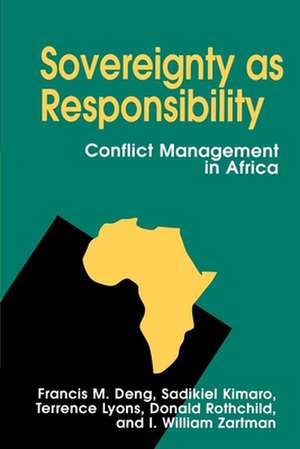Sovereignty as Responsibility: Conflict Management in Africa
Autor Francis M. Deng, Sadikiel Kimaro, Terrence Lyons, Donald Rothchild, I. William Zartmanen Limba Engleză Paperback – iun 1996
The authors assert that sovereignty can no longer be seen as a protection against interference, but as a charge of responsibility where the state is accountable to both domestic and external constituencies. In internal conflicts in Africa, sovereign states have often failed to take responsibility for their own citizens' welfare and for the humanitarian consequences of conflict, leaving the victims with no assistance. This book shows how that responsibility can be exercised by states over their own population, and by other states in assistance to their fellow sovereigns.
Sovereignty as Responsibility presents a framework that should guide both national governments and the international community in discharging their respective responsibilities. Broad principles are developed by examining identity as a potential source of conflict, governance as a matter of managing conflict, and economics as a policy field for deterring conflict. Considering conflict management, political stability, economic development, and social welfare as functions of governance, the authors develop strategies, guidelines, and roles for its responsible exercise. Some African governments, such as South Africa in the 1990s and Ghana since 1980, have demonstrated impressive gains against these standards, while others, such as Rwanda, Somalia, Liberia, Nigeria, and Sudan, have failed. Opportunities for making sovereignty more responsible and improving the management of conflicts are examined at the regional and international levels. The lessons from the mixed successes of regional conflict management actions, such as the West African intervention in Liberia, the East African mediation in Sudan, and international efforts to urge talks to end the conflict in Angola, indicate friends and neighbors outside the state in conflict have important roles to play in increasing sovereign responsibility.
Approaching conflict management from the perspective of the responsibilities of sovereignty provides a framework for evaluating government accountability. It proposes standards that guide performance and sharpen tools of conflict prevention rather than simply making post-hoc judgments on success or failure. The authors demonstrate that sovereignty as responsibility is both a national obligation and a global imperative.
Sovereignty as Responsibility presents a framework that should guide both national governments and the international community in discharging their respective responsibilities. Broad principles are developed by examining identity as a potential source of conflict, governance as a matter of managing conflict, and economics as a policy field for deterring conflict. Considering conflict management, political stability, economic development, and social welfare as functions of governance, the authors develop strategies, guidelines, and roles for its responsible exercise. Some African governments, such as South Africa in the 1990s and Ghana since 1980, have demonstrated impressive gains against these standards, while others, such as Rwanda, Somalia, Liberia, Nigeria, and Sudan, have failed. Opportunities for making sovereignty more responsible and improving the management of conflicts are examined at the regional and international levels. The lessons from the mixed successes of regional conflict management actions, such as the West African intervention in Liberia, the East African mediation in Sudan, and international efforts to urge talks to end the conflict in Angola, indicate friends and neighbors outside the state in conflict have important roles to play in increasing sovereign responsibility.
Approaching conflict management from the perspective of the responsibilities of sovereignty provides a framework for evaluating government accountability. It proposes standards that guide performance and sharpen tools of conflict prevention rather than simply making post-hoc judgments on success or failure. The authors demonstrate that sovereignty as responsibility is both a national obligation and a global imperative.
Preț: 216.54 lei
Nou
Puncte Express: 325
Preț estimativ în valută:
41.44€ • 43.37$ • 34.49£
41.44€ • 43.37$ • 34.49£
Carte tipărită la comandă
Livrare economică 31 martie-14 aprilie
Preluare comenzi: 021 569.72.76
Specificații
ISBN-13: 9780815718277
ISBN-10: 0815718276
Pagini: 290
Dimensiuni: 152 x 229 x 21 mm
Greutate: 0.41 kg
Editura: Brookings Institution Press
Colecția Brookings Institution Press
ISBN-10: 0815718276
Pagini: 290
Dimensiuni: 152 x 229 x 21 mm
Greutate: 0.41 kg
Editura: Brookings Institution Press
Colecția Brookings Institution Press
Notă biografică
Francis M. Deng is a nonresident senior fellow in the Foreign Policy Studies program at the Brookings Institution and co-director of the Brookings-SAIS Project on Internal Displacement. He has served as the Sudan's minister of state and foreign affairs; as its ambassador to Canada, the United States, and Scandinavia; and as special representative of the United Nations secretary-general for internally displaced persons. Sadikiel Kimaro is deputy division chief, African department, International Monetary Fund. Terrence Lyons is an associate professor of conflict resolution at the Institute for Conflict Analysis and Resolution and interim director of the Center for Global Studies at George Mason University.This report is sponsored by the Council's Center for Preventive Action. Donald Rothchild is professor of political science at the University of California, Davis. He is the coauthor of Sovereignty as Responsibility: Conflict Management in Africa (Brookings, 1996), author of Racial Bargaining in Independent Kenya (Oxford University Press, 1973), and coeditor of The International Spread of Ethnic Conflict: Fear, Diffusion, and Escalation (Princeton). I. William Zartman is director of the African Studies and Conflict Management programs at the Paul H. Nitze School of Advanced International Studies of the Johns Hopkins University.
Descriere
The authors assert that sovereignty can no longer be seen as a protection against interference, but as a charge of responsibility where the state is accountable to both domestic and external constituencies. In internal conflicts in Africa, sovereign states have often failed to take responsibility for their own citizens' welfare and for the humanitarian consequences of conflict, leaving the victims with no assistance. This book shows how that responsibility can be exercised by states over their own population, and by other states in assistance to their fellow sovereigns.
Sovereignty as Responsibility presents a framework that should guide both national governments and the international community in discharging their respective responsibilities. Broad principles are developed by examining identity as a potential source of conflict, governance as a matter of managing conflict, and economics as a policy field for deterring conflict. Considering conflict management, political stability, economic development, and social welfare as functions of governance, the authors develop strategies, guidelines, and roles for its responsible exercise. Some African governments, such as South Africa in the 1990s and Ghana since 1980, have demonstrated impressive gains against these standards, while others, such as Rwanda, Somalia, Liberia, Nigeria, and Sudan, have failed. Opportunities for making sovereignty more responsible and improving the management of conflicts are examined at the regional and international levels. The lessons from the mixed successes of regional conflict management actions, such as the West African intervention in Liberia, the East African mediation in Sudan, and international efforts to urge talks to end the conflict in Angola, indicate friends and neighbors outside the state in conflict have important roles to play in increasing sovereign responsibility.
Approaching conflict management from the perspective of the responsibilities of sovereignt
Sovereignty as Responsibility presents a framework that should guide both national governments and the international community in discharging their respective responsibilities. Broad principles are developed by examining identity as a potential source of conflict, governance as a matter of managing conflict, and economics as a policy field for deterring conflict. Considering conflict management, political stability, economic development, and social welfare as functions of governance, the authors develop strategies, guidelines, and roles for its responsible exercise. Some African governments, such as South Africa in the 1990s and Ghana since 1980, have demonstrated impressive gains against these standards, while others, such as Rwanda, Somalia, Liberia, Nigeria, and Sudan, have failed. Opportunities for making sovereignty more responsible and improving the management of conflicts are examined at the regional and international levels. The lessons from the mixed successes of regional conflict management actions, such as the West African intervention in Liberia, the East African mediation in Sudan, and international efforts to urge talks to end the conflict in Angola, indicate friends and neighbors outside the state in conflict have important roles to play in increasing sovereign responsibility.
Approaching conflict management from the perspective of the responsibilities of sovereignt
















